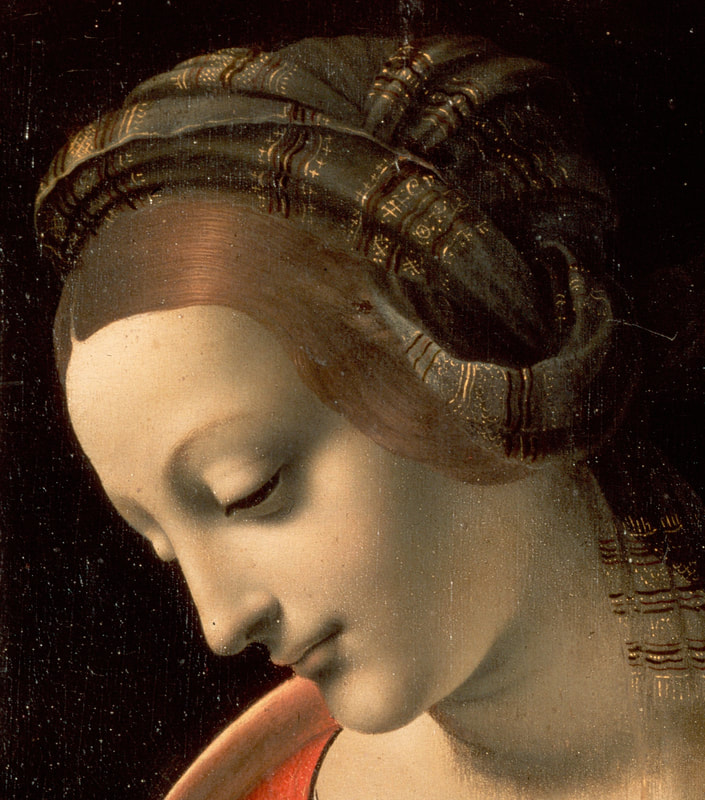|
14/12/2017 0 Comments O, Come!Detail from the "Madonna Litta”, a late 15th-century painting, traditionally attributed to Leonardo da Vinci, in the Hermitage Museum, Saint Petersburg Our first and only child was born at ten minutes to midnight on December 23rd.
I have always loved the season of Advent; that year, when I was expecting a Christmas baby, I found the Advent liturgies almost unbearably moving. In my yearning expectancy, the great ‘O’ antiphons, with their longing and mounting impatience, resonated with me as never before. It seemed to me that all the mystery of creation was contained within me. I waited for the birth with heart stopping excitement. And, through those final days of pregnancy, the beautiful, sombre rhythms of the O Antiphons seemed almost the rhythms of life itself. They are sung as though with breath held, suffused with reverence and wonder. “O come, o come” - the verb veni is repeated again and again “recalling an urgent eschatological prayer so ancient that it was offered in the native Aramaic by the earliest Christian church… It embodies the deep yearning of the exiles in the Babylonian captivity for freedom, of the post-exilic Jews for the restoration of former glories perhaps personified in the Messiah, and of the primitive church for a speedy return of its ascended Master. It is an intense prayer epitomizing all prayers whatever their content.” [1] “O come Lord Jesus” – the fervent request is as old as St Paul [2] and forms the penultimate verse of the book of Revelation and thus of the New Testament. All of these associations were with me in those final days. I felt as old as Eve, participating in the act of Creation. I woke before dawn on the eve of Christmas Eve, to the certain knowledge that our baby was on the way. Eighteen hours later, it seemed as though this baby would never be born. “Labour” is accurately named. For the previous many hours contractions had been sweeping in like tidal waves, each one picking me up like a tiny piece of flotsam and bearing me down into a new tunnel of pain and exhaustion. I no longer believed that this cruel effort was going to produce anything at all. In the brief respites between contractions I withdrew from time and the world. Inexorably drawn back by the next wave, I was surprised to find myself still there. And so it went on, hour after hour – wholly relentless, unavoidable. And then, stunning pain, pain to take the breath away, and I began to know fear. The urge to deliver the baby was inexorable – but it seemed like an urge to self-destruct. I could no more avoid it than I will be able to avoid death. Then the moment came when, at last, with a final crescendo of effort, our baby was there. I held her warm living body against me, looked into her astonishingly calm eyes and instantly, irrevocably, fell in love. She glided around my heartstrings like running water, to crystallise there - so that my heart was no longer mine but was from then on a part of her. This, then, or something like it, Mary went through. In blood and sweat and pain she went through this most elemental of experiences, lying on the mud floor of an outhouse. In the words of the opening prayer of the Dawn Mass on Christmas Day, “Almighty God… your Eternal Word leaped down from heaven in the silent watches of the night, and now your Church is filled with wonder at the nearness of her God.” The maker of the universe passed through a female womb and lay helpless and beloved on his mother’s breast as my baby did on mine. Mary must have gazed on the infant Jesus with the same wonder that mothers have felt since Eve bore the first child in creation. Her first baby, for every woman, is the first baby in the world. Nobody will have gone through a pregnancy and delivery exactly like hers. Ask any mother about her child’s birth, and the story will be absolutely unique to that mother and that baby. Nobody will feel the same sense of wonder at this particular miracle of creation. Eve’s shout of triumph after the birth of Cain still echoes down the millennia: “I have gotten a child with the help of the Lord!” On that night in Bethlehem, God became our travelling companion on life’s journey. He took on our human condition, and became subject to illness, to aging and to death. As the weeks passed, and as I held our infant daughter in my arms, feeling the warmth of her downy little head and her tiny fingers with the nails I didn’t dare to cut moving like small, lovely spiders over my skin, I thought the universe itself could not contain my wondering love. And when she smiled for the first time, the radiance lit my world from end to end. For the first time, I began to have some infinitesimal sense of God’s love for his creation. [1] Allen Cabaniss, “A Jewish Provenience of the Advent Antiphons?” The Jewish Quarterly Review, New Ser., Vol. 66, No. 1. (Jul., 1975), pp. 39-56. [2] 1Cor16:22
0 Comments
|

 RSS Feed
RSS Feed